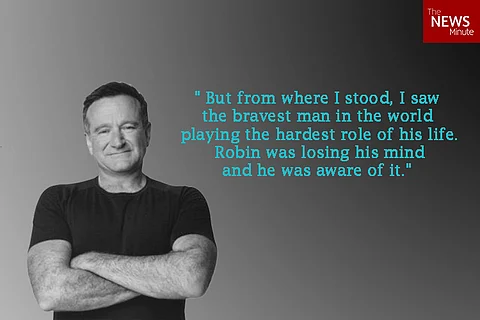

Susan Schneider Williams, the widow of renowned actor Robin Williams, has spoken up about the disease that left her husband devastated and pushed him to take his own life.
In a special editorial, titled "The terrorist inside my husband’s brain", in the journal of the American Academy of Neurology, Susan shares "a personal story, sadly tragic and heartbreaking".
Robin, an Oscar-winning actor and stand-up comedian, was suffering from Lewy body disease (LBD), a neurodegenerative disease for which there is no cure.
In her piece, Susan writes how Robin "died from suicide in 2014 at the end of an intense, confusing, and relatively swift persecution at the hand of this disease’s symptoms and pathology."
"Although not alone, his case was extreme. Not until the coroner’s report, 3 months after his death, would I learn that it was diffuse LBD that took him. All 4 of the doctors I met with afterwards and who had reviewed his records indicated his was one of the worst pathologies they had seen. He had about 40% loss of dopamine neurons and almost no neurons were free of Lewy bodies throughout the entire brain and brainstem."
She continues, "Not only did I lose my husband to LBD, I lost my best friend. Robin and I had in each other a safe harbor of unconditional love that we had both always longed for. For 7 years together, we got to tell each other our greatest hopes and fears without any judgment, just safety. As we said often to one another, we were each other’s anchor and mojo: that magical elixir of feeling grounded and inspired at the same time by each other’s presence."

In 2013, during their second wedding anniversary, Robin had already been struggling with physical symptoms- constipation, urinary difficulty, insomnia to name a few- which at the time seemed unrelated.
However, on that specific weekend, Susan says, he started experiencing gut discomfort. "Having been by my husband’s side for many years already, I knew his normal reactions when it came to fear and anxiety. What would follow was markedly out of character for him. His fear and anxiety skyrocketed to a point that was alarming. I wondered privately, Is my husband a hypochondriac?"
Over the next 10 months, the symptoms increased in both frequency and severity. Robins was now experiencing "paranoia, delusions and looping, insomnia, memory, and high cortisol levels".
He was also seeking regular psychotherapy and other medical help constantly by that time.
"How I wish he could have known why he was struggling, that it was not a weakness in his heart, spirit, or character," she states.
During the filming of "Night at the Museum 3" Robin was facing problems in remembering even one line for his scenes "while just 3 years prior he had played in a full 5- month season of the Broadway production Bengal Tiger at the Baghdad Zoo, often doing two shows a day with hundreds of lines—and not one mistake. This loss of memory and inability to control his anxiety was devastating to him."
And he would often say, "I just want to reboot my brain."
Susan Schneider Williams serves on the Board of Directors for the American Brain Foundation.
Read the full essay here.